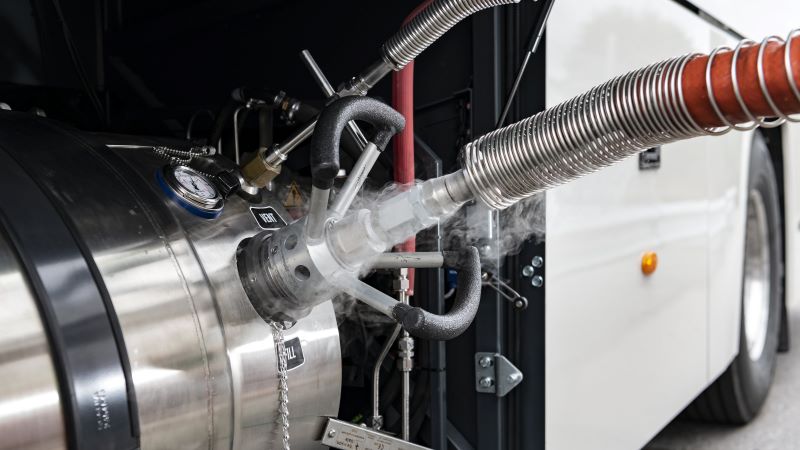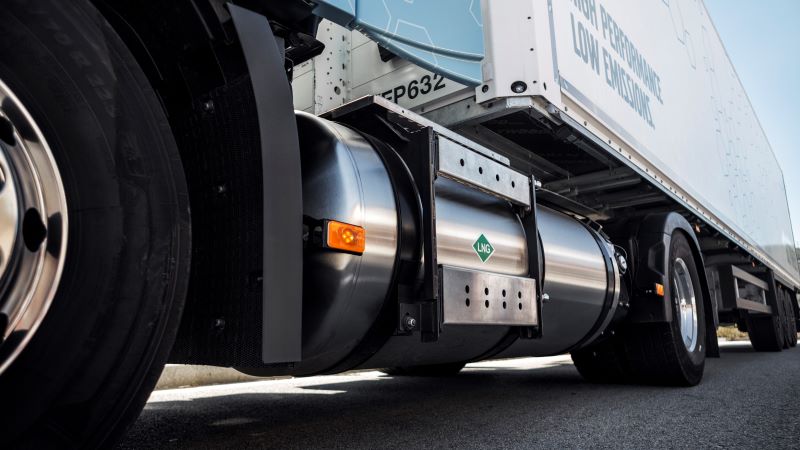LNG for commercial vehicles
Reducing CO2 emissions is an important task for road freight transport, too. Natural gas and biomethane are already available alternatives to diesel to reduce GHG emissions and air pollutants. For transport companies to invest in commercial vehicles with gas drive systems, however, reliable and long-term plannable framework conditions and market incentives are necessary.

CO2 advantage of natural gas
Because of its lower carbon content, methane causes up to 20 percent less CO2 than diesel fuel when burned. The use of pure biomethane (bio-CNG or bio-LNG) even enables CO2 savings of up to 90 percent. Synthetic methane (SNG) from renewable electricity can also be used without problems. The admixture of 20 percent regeneratively produced methane (SNG or Bio-LNG) already enables a reduction of approx. 35 percent in GHG emissions compared to a conventionally driven diesel truck. Adding renewable methane to fossil methane is possible without any quantity restrictions.
150 LNG filling stations in Europe
Natural gas is used as a fuel both in gaseous form (CNG, “Compressed Natural Gas”) and in liquid form (LNG, “Liquified Natural Gas”). There are already over 150 LNG filling stations in Europe. After a long period of stagnation in Germany, 12 LNG filling stations have been put into operation at important traffic hubs over the past two years. The number of LNG filling stations is expected to rise to over 50 in the course of 2020. Germany, as the most important transit country in the EU, will thus close a gap in the European LNG infrastructure.
Funding
Key success factors in the market ramp-up of LNG trucks were the promotion program for energy-efficient commercial vehicles (EEN) and the introduction of toll exemption for gas-powered commercial vehicles. Since these instruments came into force, more than 1,300 applications have been submitted for the promotion of LNG trucks. However, the toll exemption and the purchase promotion of LNG and CNG commercial vehicles will end on 31.12.2020 without creating alternative and long-term plannable framework conditions that would have improved the use of gas-based or other alternative propulsion systems and fuels during the period of two years limited to date. The effects are already being felt. For example, applications for funding have been declining since February 2019.

Recommendations
In order for natural gas or biogas as an alternative fuel to be able to exploit its CO2 advantage in heavy trucks, reliable framework conditions and incentive systems for investments are needed that enable long-term corporate decisions and market developments.
The “Energy-efficient and/or low-CO2 heavy commercial vehicles” (EEN) funding programme and the toll exemption are the key elements in making gas-based commercial vehicles competitive with conventional drive systems from a cost perspective. However, apart from the toll exemption and the support programme, there is currently no effective financial and regulatory framework that would allow alternative drive systems to compete. Rapid decisions are therefore needed to extend the toll exemption and the support program.
The international manufacturers, together with the members of the LNG Task Force, recommend the following measures to the German government:
- continuation of the toll exemption for at least another two years
- transitional arrangements until the introduction of a CO2-oriented truck toll
- continuing the promotion of the purchase of LNG vehicles for heavy goods transport

